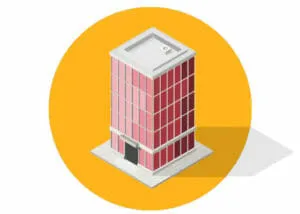
Some insights on the prevalent market dynamics.
Key Sections
- Business Disruption: Courtesy of COVID-19
- Remote work: A trend that may outlive the outbreak.
- An emerging Office Sector trend in Malta
- Positioning the Office Sector for a quick rebound
- Flexibility: A key factor to minimise the impact of COVID-19
- Renegotiation of Commercial leases in Malta
- Have the tables turned on landlords?
- Advice to Commercial Real Estate Buyers
- Setting the mindset for a rapid commercial real estate recovery
Business Disruption: Courtesy of COVID-19

With the storm that COVID-19 has caused in every aspect of the commercial real estate (CRE) market – from the tourism market, which generates a substantial part of Malta’s GDP, to the office sector, where most employees have now relocated to working from the comfort and safety of their homes – many Real estate investors are asking themselves “what is COVID-19’s impact on Commercial Real Estate in Malta?”
Before the outbreak, remote working from home was an aspect to work that was mainly ‘enjoyed’ by a select few. This is especially true for employees in the services sector operating mostly in the tech industries – namely: iGaming, fintech, digital advertising, and e-commerce. The typical requirement of such work is that the employees are to be equally productive whilst working from a laptop/desktop (with an internet connection) from anywhere around on the globe when compared to productivity from the office.
Businesses are now facing the challenge of adopting this model ASAP for business continuity, to minimize disruptions to their revenue streams, and to mobilise idle resources.
This shift is set to disrupt the commercial real estate sector in a variety of ways. Some of which we will discuss below.
Remote work: a trend that may outlive the outbreak
 Once the COVID-19 outbreak makes its way into our rear-view mirrors, it is likely that companies that operate from certain office environments will re-evaluate their commercial real estate requirements. The main reason being, that if a company transitions well into a comparable level of efficiency with a majority of their workforce operating remotely, it may find that its requirements and priorities for office space will change.
Once the COVID-19 outbreak makes its way into our rear-view mirrors, it is likely that companies that operate from certain office environments will re-evaluate their commercial real estate requirements. The main reason being, that if a company transitions well into a comparable level of efficiency with a majority of their workforce operating remotely, it may find that its requirements and priorities for office space will change.
This does not necessarily mean that the office market will suddenly see a plunge in demand. Far from it.
It is likely that companies will become more inclined to turnkey, serviced offices, and co-working or shared workspaces will become more in demand – A trend that has already picked up before the Coronavirus outbreak.
Post-COVID-19 – whilst impossible to ascertain – it is likely that we will see an increase in this trend, where short/medium term office rentals are going to take up an increasing amount of the market share previously reserved for long-term lease commitments by many office occupants.
This news may not be received well by some landlords and owners of large office spaces, but it need not be that way.
In the past 5 years, serviced office solutions on the islands have taken off and with great success. A host of providers have started to lease out large office spaces and business centres for the long term. These centres are then being sublet in parts to smaller operators looking for short and medium-term solutions to meet their office requirements.
An emerging Office Sector trend in Malta
A global franchise and local operator – one of the global leaders in this sector – pioneered this model in Malta in 2008, when it was the only company offering this solution for a number of years. Fast-forward to 2020 and it has now opened another two centres in St. Julian’s in the last three years with over 2,000m2 of office space available to keep up with the demand for premium serviced office spaces and flexible corporate solutions.
This has enabled it to meet an ever-growing demand for this sector and satisfy requests for offices from one-man operations to teams of up to 20 members – and more if needed.
Till today, it remains a leader in this sector, yet, as is the way with successful business models, many similar operators have started to enter the market and take jabs at its market share.
Like it, there are a lot of businesses that are looking for ideal centres in Malta’s top locations. The idea being that they would set-up these types of operations that may cater to one of the fastest-growing sectors of real estate globally – So demand is definitely here. It may have stalled slightly with the COVID-19 impact, however, it’s set to bounce back stronger than ever once things start getting back to normal.
Positioning the Office Sector for a quick rebound
What is the recommended approach that landlords should take here? That may depend on the landlord’s appetite for activity after the uncertainty caused by the Coronavirus subsides – For landlords in the office sector who don’t mind to involve themselves with a more active role in the operation of their commercial real estate assets, they may opt to offer the serviced solutions themselves.
 For those landlords who prefer a more passive approach, they may opt to sublet space to the various operators on the island who are offering this kind of serviced office solution.
For those landlords who prefer a more passive approach, they may opt to sublet space to the various operators on the island who are offering this kind of serviced office solution.
Partnerships may also be on the cards for this type of setup, so in reality, the options for commercial real estate owners/investors are plentiful.
MaltaOffices.com has assisted clients with these types of requests since 2012 – from consultations regarding the running of these operations to sourcing of suitable properties for commercial subletting, and negotiation of agreements – so we’re confident that demand is there, and the infrastructure in Malta supports this model well.
Flexibility is key to minimise the impact of COVID-19
During times of uncertainty businesses as well as individuals tend to defer decision-making and ‘sit on the fence’ so the COVID-19 outbreak will – to some extent – negatively affect demand for offices for rent in Malta in the short term.
Whilst the office rental market may not necessarily be impacted as heavily as other sectors like catering establishments and hotel operators, a certain level of flexibility and adaptability may be required by Malta’s commercial real estate owners in order to minimise the COVID-19 impact on their real estate assets.
For this reason, commercial real estate professionals like myself are suggesting that landlords take a more active approach to their leasing strategies in order to capitalise on the office’s sector new sub-markets, which – whilst already gaining sizeable market share – will surely start to absorb demand more rapidly as a result of the COVID-19 outbreak.
Renegotiation of Commercial Lease terms in Malta
 The COVID-19 impact on prices for commercial real estate, in general, seems to be on everyone’s mind at present. That is true for long-standing CRE owners, those who just bought a property, and others who didn’t get a chance to buy as they got priced out with the recent sharp price increases that Malta experienced in the last 5 years.
The COVID-19 impact on prices for commercial real estate, in general, seems to be on everyone’s mind at present. That is true for long-standing CRE owners, those who just bought a property, and others who didn’t get a chance to buy as they got priced out with the recent sharp price increases that Malta experienced in the last 5 years.
A Legal Notice whereby a closedown of all bars, restaurants, gyms, casinos, cinemas and bingo halls has been instructed by the government – nonetheless, tenants are obligated to pay the rent.
It is in cases like these that landlords will need to evaluate their tenant’s situation with a level head and help them to navigate this stormy weather with a helping hand. There will be those businesses who don’t survive this outbreak – as they may have ‘got caught on one leg’, so any help that landlords may give to their struggling tenants will help keep that number to a minimum and ensure business continuity for the majority.
Have the tables turned on landlords?
Numerous commercial real estate tenants have understandably voiced their fears with their landlords, yet we’ve heard of instances where tenants have been particularly ‘enterprising’ and have asked for Coronavirus-related reductions in their monthly rent as far as 50%, “or else”.
In some cases, the rent reduction request has also been coupled with a grace period (free rent) request.

There are many cases that have genuinely been impacted – be it because of business slow-down in general or because of government instructed close-down to reduce the spread of the Coronavirus. However, this emerging trend by some opportunistic tenants looking to seize the opportunity to renegotiate favourable lease terms with their landlords (and capitalise on the current market environment) is abusive and is to be regarded as such.
In these situations, it’s encouraged that landlords get a second opinion from a trusted commercial real estate agent to evaluate their situation and make informed decisions before giving in to unreasonable demands.
Getting bullied into slashing rents (not to lose a tenant) is not the only option available to landlords whose tenants may find themselves in a squeeze.
These considerations are of a sensitive nature and each one is to be evaluated carefully. This may be achieved by weighing in as many factors as possible and taking an objective approach to finding the best possible outcome for all parties involved.
The impact of the COVID-19 on CRE is being felt across all sectors, yet it is expected to have a short to medium term impact – not an eternal one. It follows that landlords are being cautioned against renegotiating agreements for long-term discounts or grace-periods which may result in them getting locked in an agreement with unfavourable terms for a duration that may go way past the outbreak.
Advice to Commercial Real Estate Buyers
 As expected, many members of the Maltese community are understandably shaken by the events that have struck Malta in the past weeks because of this novel Coronavirus, yet it is also a time when real estate transactions are still being sought as several property investors are looking to buy.
As expected, many members of the Maltese community are understandably shaken by the events that have struck Malta in the past weeks because of this novel Coronavirus, yet it is also a time when real estate transactions are still being sought as several property investors are looking to buy.
Some buyers may have been involved in the buying process long before the outbreak struck, whereas others are in the market as a result of the outbreak, and hoping to find themselves a bargain.
For most property investors, Real Estate as an asset class is favoured primarily because of the long-term capital growth, the resulting cash-flow is also a substantial driver however it generally takes a secondary priority after capital appreciation.
For this reason, investors should consider carefully before initiating any property transfers in this period of uncertainty and not act out of impulse if they come across a ‘once in a lifetime opportunity’.
Primarily, commercial real estate investors should make sure that they’re financially in a bullet-proof position and capable of coping with abnormally long vacancy rates. Alternatively, they should accept the fact that they may need to provide some incentives to attract tenants, such as deferred rent collection, or some favourable added value.
If they do decide to go ahead with a promise of sale and eventual contract (once the registry is back to normal operations), they should consider paying a discounted price for the unit, to reflect the risk of further price reduction, as well as the risk of not earning any cash-flow – at least until the market is back on its feet.
Setting the mindset for a rapid commercial real estate recovery.
 The need for Social distancing is what has hit the commercial real estate sector harder than most, yet the impact of COVID-19 is not absolute on all areas, and will inevitably vary by location, and the average lease period of properties in question.
The need for Social distancing is what has hit the commercial real estate sector harder than most, yet the impact of COVID-19 is not absolute on all areas, and will inevitably vary by location, and the average lease period of properties in question.
The duration of any government-imposed lockdown and legal notices is also another determinant of how far the impact will be felt.
It is far too early to quantify what the impact of the COVID-19 crisis on commercial real estate in Malta will eventually amount to. Whilst observing the crisis unfold, inaction and reluctance to accept change are unlikely to mitigate losses, let alone bear any fruits.
This time of uncertainty may be used more effectively by those in the know to determine upcoming market trends and resulting behaviours. The logical countermove being that of positioning oneself to leap at the first opportunity and take advantage of this unexpected new chapter in Malta’s commercial real estate market.
 Etienne Licari has been operating within Malta’s Commercial Real Estate industry since 2010 and has successfully assisted numerous companies throughout their corporate journeys.
Etienne Licari has been operating within Malta’s Commercial Real Estate industry since 2010 and has successfully assisted numerous companies throughout their corporate journeys.
Reach him here for any queries related to Commercial Real Estate in Malta.
